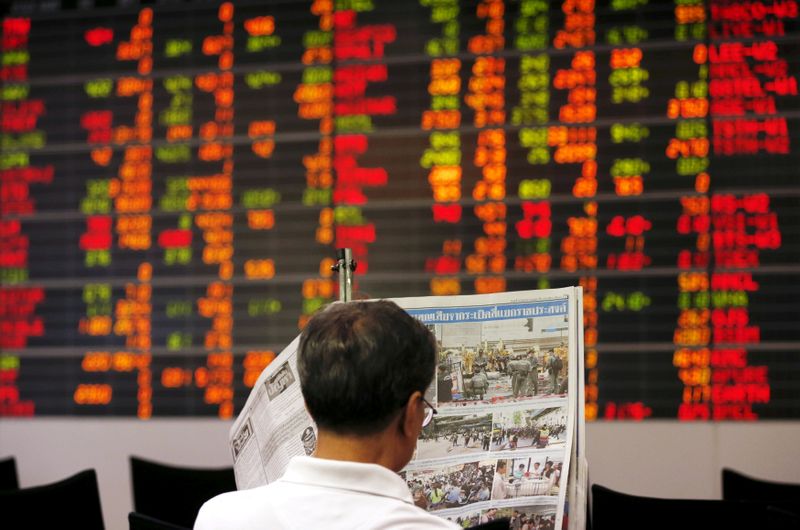By Stanley White and Swati Pandey
SYDNEY/TOKYO (Reuters) - Stock and currency markets in Thailand, South Korea and Australia are bearing the brunt of investors' scramble to hedge the mounting risks from a new viral outbreak in China during a long holiday on the mainland.
In the week since the spreading coronavirus became a mainstream market concern, every hour has brought headlines of mounting cases or another Chinese city shutting public transport or a country telling citizens not to travel.
Stock markets from South Korea to Thailand have fallen hard, with transport, tourism, retail and luxury stocks badly hit.
Investors sold the Australian and New Zealand dollars as a proxy for the yuan, while also buying their sovereign bonds and U.S. Treasury debt on wagers central banks globally might have to ease policy to offset the economic drag from the virus.
It was a shift made all the more prominent by the closure of Chinese markets for the week-long new year holiday, which has forced investors to hedge through proxies.
"I want to buy Chinese government bonds with around 5-years’ duration. People already believe China's economy will slow down, so there will be more upside for these bonds. I need to wait until China’s markets re-open," said Toshinobu Chiba, chief portfolio manager in the fixed income department at Nissay Asset Management Corp in Tokyo.
Chiba is therefore using the forward curve in the offshore Chinese yuan to express his views, while also buying shorter term U.S. Treasury bonds and swapping his lower quality corporate bonds for higher.
"Normally, in a situation like this, people would want to be long in countries with current account surpluses, like South Korea, Singapore or Taiwan, but you cannot because of their correlation with China," he said, adding that was why he was avoiding the Korean won.
Stock markets in Thailand (SETI) and Korea (KS11) have fallen more than 2% in the past week, taking a bigger hit than U.S. and world stocks broadly. A large China ETF - iShares Large-Cap ETF (P:FXI) sank nearly 4% on Monday and is now down about 10% since Jan. 17.
The baht is Asia's worst performer for the year, with losses against the dollar nearly 3%.
STRETCHED STOCK VALUATIONS
Analysts at JPMorgan (NYSE:JPM) recommended clients use currency options to hedge cheaply, given how low the measures of expected volatility were. To brace for a negative impact on the tourism sectors in Malaysia and Thailand, JPMorgan said it is changing to neutral an underweight holding in Thai government bonds and an overweight position in Malaysia's ringgit .
That demand for cheap hedges has seen implied volatility on offshore yuan rise by about a percentage point across tenors in the past week.
Chris Rands, Sydney-based portfolio manager for Nikko Asset Management, is tracking the spreads on credit default swaps, which are insurance products used to hedge against default risk, between those on Australia and the United States as one barometer of negative sentiment.
He hasn't put on a trade yet, though, and many other big fund managers said they are sitting tight.
"We don't have enough information to know how bad this is so we don't think we should be making huge decisions on the back of that," said Rands.
The panic engulfing markets and the resulting dive in bond yields could help underpin equity valuations, at least in the major developed nations, leaving emerging markets to bear the brunt.
Optimists argue that this episode would not be a repeat of the 2003 outbreak of severe acute respiratory syndrome (SARS), in part because Beijing had acted more quickly and radically this time.
While the SARS outbreak initially caused steep losses for Asian stocks, they rebounded smartly in its wake.
One hurdle this time is that many equity markets globally are trading at stratospheric valuations. The U.S. S&P 500 index (SPX) is trading at a price-earnings ratio above 23, last seen in late 2018. Valuations for the MSCI world equities index (MIWD00000PUS) are also at 2018 highs. "For those looking to play the big rebound, keep in mind in 2003, the entire backdrop was completely different as most risky assets were already at the lows, not highs, after the tech bubble blew up and the U.S. recession," said Stephen Innes, Asia Pacific market strategist at AxiCorp.

"So the rebound comparison is invalid on many levels."